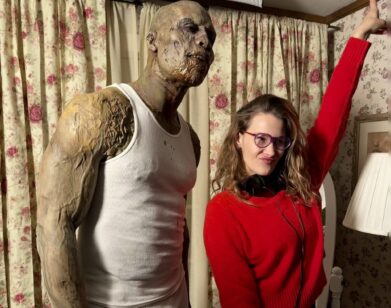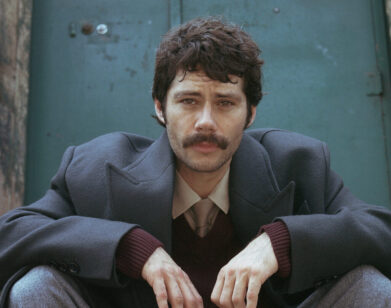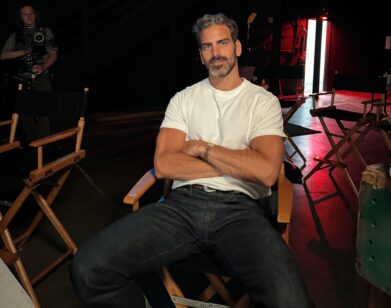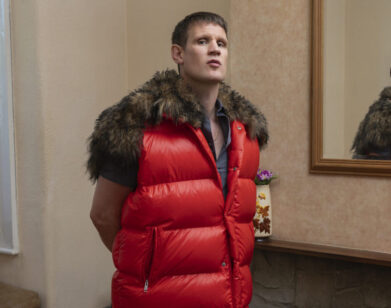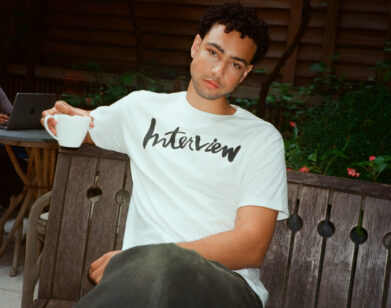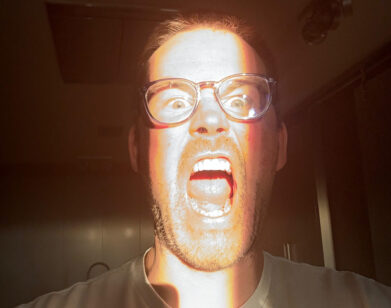Diablo Cody’s Lamb in Las Vegas
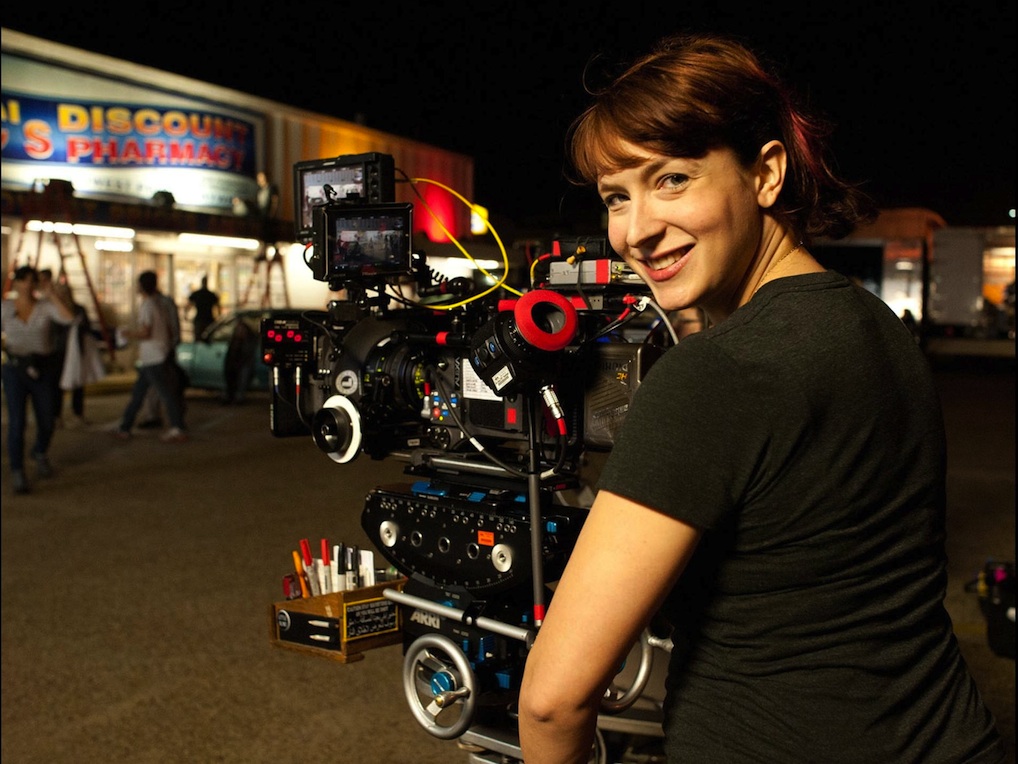
ABOVE: DIABLO CODY ON THE SET OF PARADISE
Diablo Cody writes fascinating female characters. In keeping with the audacious feminist screenwriter and cheeky catch-phrase coiner who created them, Cody’s protagonists radiate an up-front intelligence, delivered with a snappish eloquence.
The main character in Cody’s directorial debut, Paradise, hits these marks, but is a world apart from Cody’s other forceful females. Lamb (yes, the symbolism in this movie is heavy) grew up in a tiny, devoutly religious town. She is a God-fearing, Christian-rock-singing, pop-culture-ignorant innocent. After a horrifying accident leaves her brutally disfigured and in doubt of a higher power, the mousy Lamb heads to the Las Vegas, City of Sin. Despite the best-laid plans of mousy women, she spends most the evening flirting with Russell Brand, not that that would disappoint the average traveler seeking a bit of sinning. By the end of the movie, resolutions were made, lessons learned, purposes purported, and true souls discovered.
Here, Cody analyzes her tier of female protagonists and talks about deploying feminism in the film industry, her creative echoes, and Prodigy, her forthcoming YA television series with the creators of Gossip Girl.
MAGGIE LANGE: Hey Diablo. Tell me about how Paradise relates to some of your previous projects. Something that I saw as a connection between some of your movies was a tension between innocence and worldliness.
DIABLO CODY: Absolutely, yeah. I feel like I’ve revisited that theme with every movie that I’ve been involved with. The theme is, for me, about transformation. And in some cases it’s a physical transformation—in fact, it’s always a physical transformation because in Juno, she gets pregnant. In Jennifer’s Body, Jennifer transforms into this monster. In Young Adult, the theme is proven more subtly, but it’s really about aging. It’s about that transformation. And then in Paradise, Lamb obviously endures this terrible physical trauma and has to learn to be herself again. The idea of a person being transformed by a major event in their life is just something I keep returning to and I’m not sure why. It must resonate with me in some way.
LANGE: Something that I saw in Paradise that seems like it is going to be a theme in your new TV show Prodigy is about what it means to be wise and intelligent. In all your movies, you have characters who boast different types of “smart.” Is that a theme that interests you?
CODY: Yeah, it is, actually. People, when they see Paradise, might think of Lamb as just being this stereotypical wide-eyed blonde, but in fact I think she’s very intelligent, very articulate, knows where she stands, but I think prior to the accident she was probably kind of a ball-buster. We don’t get to see her at that time but I think that she’s definitely somebody who knows who she is. And even though she hasn’t been exposed to the same conversations that the people she meets have been exposed to, she is part of them in a way.
Prodigy is a relatively new project and I’m really excited about that. To me, that’s going to be fun to play with—the idea of this girl having an exceptional brain and adult intellect, really, but she’s not really sure how to socialize or how to deal with peer pressure.
LANGE: And that theme of socializing and peer pressure is also part of Paradise.
CODY: Yeah, it is. Paradise is complicated because I think maybe superficially it comes off as being a movie about somebody who’s never experienced sin or pleasure and then she goes to Vegas and she experiences all these things and it’s kind of all tied up in a bow when in fact that’s not really what the movie is. In a lot of ways her pursuit of sin is ultimately disappointing for her and she realizes that she might actually be a good girl after all.
LANGE: You’ve done a lot of work with the Athena Film Festival and supporting female filmmakers. I was wondering if you saw the hesitancy of women directors and women in the media to declare themselves as feminists as something that was fading?
CODY: I don’t, really. Unfortunately, I can’t fault other writers and directors for how they choose to present themselves, but I just think people are very fearful of declaring themselves as feminists because it’s just confused with being misandry. And if you get labeled a man-hater in this town, you’re screwed. Men are still the gatekeepers.
For me, I’ll never stop identifying as a feminist, and I think the conversation about women in film is very important. I know there are other women who don’t agree with me and say, “No, we need to stop talking about that and start talking about our work and just do the work and just show them that we can do it.” And I’m like, “No.” I don’t know how to say it. If we really had just sat back and not engaged in conversations about feminism, we would have no projects thus far. So, you have to have the balls to talk about those things, even if other people might find it off-putting.
LANGE: Previously, you have said that writers need the freedom to create a multitude of female characters, not just role models or “good” characters. Are you consciously thinking about feminism and what your female characters mean in a grander sense when you write?
CODY: All I’m thinking about is their presentation. Like, I don’t see enough movies with female protagonists. I don’t see enough movies where women have the best lives. I still see a lot of movies where women are just supporting characters or accessories. So, my job is just to create these roles. I don’t specifically think, “Okay, I think this character is a feminist icon.” Not at all. I think the movies would be really insufferable if that were the case. For me, it’s more about is this story about a woman? Does the story belong to a woman? Does she have agency in the story? And if the answer’s “yes,” then I’m happy.
LANGE: Are there other female filmmakers, or writers, or creators who you see as also valuing this sense of agency and centeredness with women in their films?
CODY: Yeah, I mean, I look at someone like Jenji Kohan. I don’t know if you’ve been watching Orange is the New Black…
LANGE: Yes. All of it.
CODY: That, to me, is so exciting week after week, to see a story that is entirely about women and every story belongs to them. And it’s about the friendships between women and the relationships between women and alliances. It’s surreal because we see a lot of shows just about men. I can’t think of a time I saw a show like this with an all-female cast. That’s very exciting to me. Sofia Coppola has had a lot of very interesting female protagonists in her work. There’s definitely a lot of stuff out there that inspires me. Lately, there’s more stuff inspiring me than pissing me off, to put it that way.
LANGE: Was there a movie, or TV show, or a year, where you realized, “Okay, now I am happy with more things than angry about them.”
CODY: I mean, I’ll always be a little mad because that’s just who I am. For instance, last night, I went to see Gravity and I thought, “Okay, this is cool.” Characters like Sandra Bullock, she is an astronaut and it’s amazing. I feel like ordinarily that really would have been a male lead and it was cool to see that.
LANGE: Can we chat about what’s going on with your Sweet Valley High project?
CODY: Oh god, I wish I could. I always feel like that movie’s so close to being greenlit. And, indeed, it is. But we just gotta get over that final hurdle. It’s so hard to get everybody’s schedules coordinated. That’s really the hard part. Is the director available? Is everybody available? I’m very, very excited about Sweet Valley High and I believe that it will happen.
LANGE: Is there something funnily meta to you about doing Sweet Valley High after Young Adult, where the main character writes books similar to Sweet Valley High?
CODY: Oh my god, totally, totally! I wrote Young Adult because that whole world of the creation of the Sweet Valley High series was so intriguing to me that I thought to myself, “I wonder what it’s like being one of the ghost writers?” Young Adult was born out of that.
Honestly, I’ve been working on Sweet Valley High for so long… But I mean, even in Paradise, the opening shot is like a blonde girl staring at a different blonde girl, but they’re the same blonde girl. And it’s like, that was my little shout-out to Sweet Valley High. It was an appetizer.
PARADISE COMES OUT FRIDAY, OCTOBER 18.

